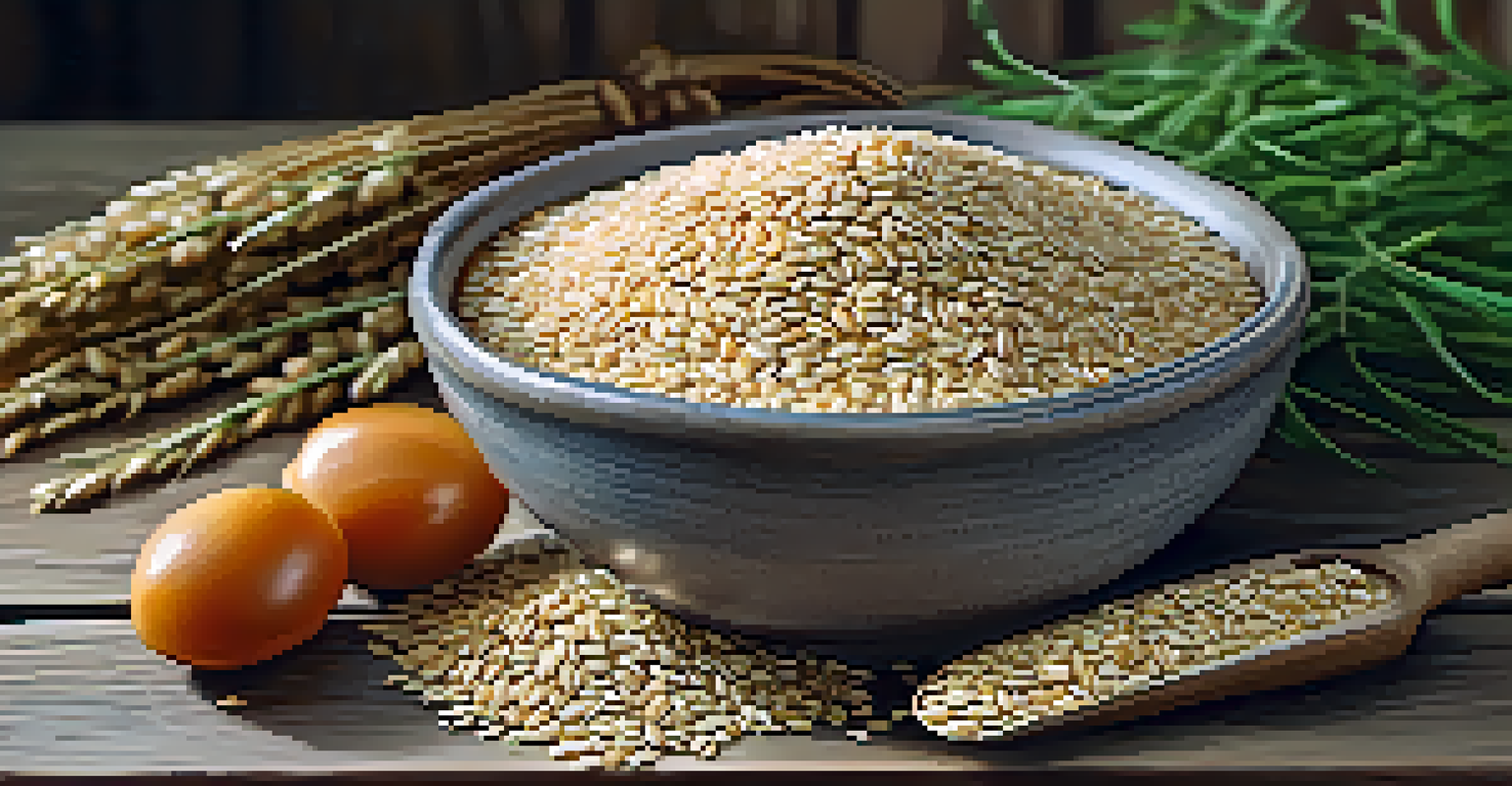Nutritional Advantages of Organic Ingredients for Vegetarians

Understanding Organic Ingredients and Their Benefits
Organic ingredients are grown without synthetic pesticides or fertilizers, making them a healthier choice. For vegetarians, choosing organic means consuming produce that is more nutrient-dense and free from harmful chemicals. The emphasis on sustainable farming practices also supports soil health and biodiversity, which are crucial for our environment.
Let food be thy medicine and medicine be thy food.
Eating organic can lead to a higher intake of antioxidants and vitamins, as these ingredients are often fresher and harvested at their peak ripeness. For example, organic tomatoes have been shown to contain higher levels of lycopene, a powerful antioxidant. This not only benefits your health but also enhances the flavor of your meals, making them more enjoyable.
Moreover, many organic farms focus on crop rotation and sustainable practices, which can lead to richer soil and better nutrient profiles in the crops. As a vegetarian, incorporating these organic ingredients into your diet not only nourishes your body but also aligns with a lifestyle that promotes environmental stewardship.
Higher Nutrient Content in Organic Produce
Research indicates that organic fruits and vegetables can possess higher levels of vitamins and minerals compared to their conventionally grown counterparts. For instance, studies have shown that organic spinach has more iron and magnesium, essential nutrients for vegetarians. This difference can make a significant impact on overall health, particularly in a plant-based diet.

Additionally, the lack of synthetic fertilizers in organic farming means that plants have to develop deeper root systems to access nutrients. This natural growth process often results in produce that is not only tastier but also more nutritious. Therefore, when vegetarians choose organic, they are likely getting more bang for their buck in terms of nutrients.
Organic Ingredients Boost Health
Organic ingredients are richer in nutrients and free from harmful chemicals, making them a healthier choice for vegetarians.
Incorporating a variety of organic vegetables into your meals can ensure you're receiving a broad spectrum of nutrients. From vibrant bell peppers to leafy greens, the diversity of organic options can help vegetarians meet their dietary needs while enjoying delicious, fresh flavors.
The Role of Organic Grains in a Vegetarian Diet
For vegetarians, grains are a staple, and choosing organic options can enhance their nutritional value. Organic grains such as quinoa, brown rice, and oats are not only free from harmful chemicals but also tend to have higher fiber content. This is essential for digestive health and helps keep you feeling full longer.
You are what you eat, so don't be fast, cheap, easy, or fake.
Furthermore, organic grains are often less processed than conventional ones, retaining more of their natural nutrients. For example, organic whole grains contain more B vitamins, which are crucial for energy metabolism. This can be particularly beneficial for vegetarians who may need a bit of extra energy to support their active lifestyles.
By incorporating organic grains into your diet, you can create wholesome meals that are both nutritious and satisfying. Whether in salads, bowls, or as a side dish, organic grains can elevate your vegetarian meals while contributing to your overall health.
Benefits of Organic Dairy and Eggs for Vegetarians
For lacto-vegetarians, organic dairy products offer numerous nutritional advantages. Organic milk and cheese often contain higher levels of omega-3 fatty acids and vitamin E, which are beneficial for heart health. These nutrients are vital, especially for those who may not consume fish or other sources of omega-3s.
Similarly, organic eggs are a great source of protein and essential vitamins. They have been found to contain more vitamin D and omega-3s compared to conventional eggs. This makes them a valuable addition to a vegetarian diet, providing essential nutrients that support overall health.
Sustainable Choices Matter
Choosing organic supports sustainable farming practices, benefiting both personal health and the environment.
Choosing organic dairy and eggs not only benefits your health but also supports humane farming practices. Organic farms typically prioritize animal welfare, ensuring that livestock are raised in healthier, more natural environments.
Organic Legumes: A Powerhouse for Vegetarians
Legumes are a vital part of a vegetarian diet, providing essential protein and fiber. Organic beans, lentils, and peas often contain higher concentrations of nutrients, such as iron and folate, which are critical for vegetarians. These nutrients help combat deficiencies that can arise from excluding meat from the diet.
Moreover, organic legumes are usually grown in healthier soils, which contributes to their nutrient density. The farming practices empower the plants to absorb more minerals, leading to a richer flavor and better overall quality. This can make your meals more satisfying and enjoyable.
Incorporating organic legumes into salads, stews, or as standalone dishes can not only enhance your nutrition but also add variety to your meals. Their versatility makes them an excellent choice for creating delicious vegetarian recipes that fuel your body.
The Impact of Organic Nuts and Seeds on Health
Nuts and seeds are excellent sources of healthy fats, protein, and a variety of essential nutrients. Organic versions of these foods often have higher levels of antioxidants and beneficial compounds, such as magnesium and zinc. For vegetarians, these nutrients play a critical role in maintaining energy levels and supporting overall health.
For example, organic almonds and walnuts are packed with omega-3 fatty acids, which are important for heart health. They also make for a great snack or addition to meals, providing a crunchy texture and rich flavor. Choosing organic means you're likely opting for nuts and seeds free from harmful additives and pesticides.
Diverse Organic Options Available
Incorporating a variety of organic produce, grains, and legumes into your diet enhances nutrition and keeps meals exciting.
Including organic nuts and seeds in your diet can also promote satiety, helping to control hunger and support weight management. Whether sprinkled on a salad, blended into smoothies, or enjoyed on their own, they offer a plethora of health benefits for vegetarians.
Sustainable Eating: The Broader Benefits of Organic Choices
Choosing organic ingredients is not just about personal health; it also contributes to environmental sustainability. Organic farming practices focus on maintaining soil health, reducing pollution, and promoting biodiversity. For vegetarians, this aligns perfectly with a lifestyle that often prioritizes environmental concerns.
By supporting organic farmers, you help foster agricultural systems that are less reliant on chemical inputs and harmful practices. This not only benefits your health but also supports local economies and promotes healthier ecosystems. Every organic purchase is a step toward a more sustainable food system.

Moreover, the emphasis on seasonal and local organic produce can encourage a more mindful approach to eating. This not only enhances the nutritional quality of your meals but also connects you with your community and the food you consume, creating a more meaningful eating experience.